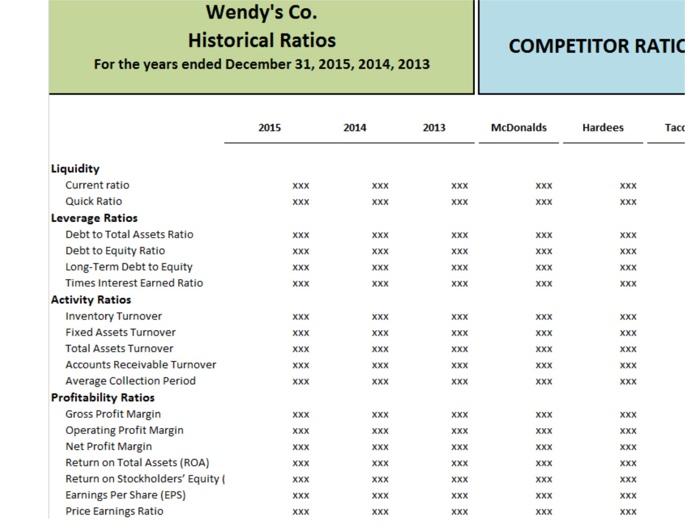Answered step by step
Verified Expert Solution
Question
1 Approved Answer
Excel Project on Walmart Overview Competitor #1 Income Statement (Tab 5) , Competitor #1 Balance Sheet (Tab 6) , Competitor #1 Cash Flows (Tab 7
Excel Project on Walmart 
Wendy's Co. Historical Ratios For the years ended December 31, 2015, 2014, 2013 COMPETITOR RATIC Liquidity Current ratio Quick Ratio Leverage Ratios Debt to Total Assets Ratio Debt to Equity Ratio Long-Term Debt to Equity Times Interest Earned Ratio Activity Ratios Inventory Turnover Fixed Assets Turnover Total Assets Turnover Accounts Receivable Turnover Average Collection Period Profitability Ratios Gross Profit Margin Operating Profit Margin Net Profit Margin Return on Total Assets (ROA) Return on Stockholders' Equity ( Earnings Per Share (EPS) Price Earnings Ratio xxx xxx xxx xxx xxx xxx xxx xxx xxx xxx xxx xxx xxx xxx xox xxx xxx xxx xxX xxx xxx xxx xxx xxx xxx xxx xxx xxx xxx xxx xxx xxx xx xxx xxx xxx xxx xxx xxx xxx xxx xxx xxx xx xxx xxx xxx xxx xxx xxX xxx xxx xxx xxx xxx xxx xxx xxx xxx xxx xxx xxx xxx xxx Wendy's Co. Historical Ratios For the years ended December 31, 2015, 2014, 2013 COMPETITOR RATIC Liquidity Current ratio Quick Ratio Leverage Ratios Debt to Total Assets Ratio Debt to Equity Ratio Long-Term Debt to Equity Times Interest Earned Ratio Activity Ratios Inventory Turnover Fixed Assets Turnover Total Assets Turnover Accounts Receivable Turnover Average Collection Period Profitability Ratios Gross Profit Margin Operating Profit Margin Net Profit Margin Return on Total Assets (ROA) Return on Stockholders' Equity ( Earnings Per Share (EPS) Price Earnings Ratio xxx xxx xxx xxx xxx xxx xxx xxx xxx xxx xxx xxx xxx xxx xox xxx xxx xxx xxX xxx xxx xxx xxx xxx xxx xxx xxx xxx xxx xxx xxx xxx xx xxx xxx xxx xxx xxx xxx xxx xxx xxx xxx xx xxx xxx xxx xxx xxx xxX xxx xxx xxx xxx xxx xxx xxx xxx xxx xxx xxx xxx xxx xxx Overview
Competitor #1 Income Statement (Tab 5), Competitor #1 Balance Sheet (Tab 6), Competitor #1 Cash Flows (Tab 7), Competitor #2 Income Statement (Tab 8), Competitor #2 Balance Sheet (Tab 9), Competitor #2 Cash Flows (Tab 10), Historical and Competitor Ratios (Tab 11)
Instructions
Continue in the same Excel workbook prepared in Module2: Week 2, adding the following tabs:
o The 5th tab and 8th tabs in your Financial Statement Analysis Template must be labeled (CompetitorCompany Name) Income Statements. (Replace Competitor Company Name with the name of the competitor.)
Include the latest three years of income statements for your competitor based on SEC filings.
Ensure that the worksheet includes a header with:
Company Name
Financial Statement Name (Income Statements)
Financial Statement Dates
Denomination level ($s in millions or thousands, etc.)
o The 6th and 9th tabs in your Financial Statement Analysis Template must be labeled (Competitor Company Name) Balance Sheets. (Replace Competitor Company Name with the name of the competitor.)
Include the latest three years of balance sheets for your first competitor based on SEC (10-K) filings. (Note: Some 10-Ks only provided 2 years of balance sheet data. You may need to download the second most recent 10-K for your company in order to obtain 3 years of balance sheet data.)
Ensure that the worksheet includes a header with:
Company Name
Financial Statement Name
Financial Statement Dates
Denomination level ($s in millions or thousands, etc.)
o The 7th and 10th tabs in your Financial Statement Analysis Template must be labeled (Competitor Company Name) Cash Flows. (Replace Competitor Company Name with the name of the competitor.)
Include the latest three years based on SEC (10-K) filings.
Make sure that the Income Statement, Balance Sheet, and Cash Flows Statement tie in as follows:
Net Income from Income statement agrees with Net Income on the Statement of Cash Flows
Ending Cash Balance from Statement of Cash Flows agrees with Cash in the Balance Sheet
o The 11th tab in your Financial Statement Analysis Template must be labeled Historical and Competitor Ratios
The list of ratios to be included are as follows. They should be grouped under the headings, as shown:
Liquidity Ratios
o Current Ratio
o Quick Ratio
Leverage Ratios
o Debt to Total Assets Ratio
o Debt Equity Ratio
o Long-Term Debt to Equity
o Times Interest Earned Ratio
Activity Ratios
o Inventory Turnover
o Fixed Assets Turnover
o Total Assets Turnover
o Accounts Receivable Turnover
o Average Collection Period
Profitability Ratios
o Gross Profit Margin
o Operating Profit Margin
o Net Profit Margin
o Return on Total Assets (ROA)
o Return on Stockholders Equity (ROE)
o Earnings Per Share (EPS)
o Price Earnings Ratio
Calculate the ratios for your chosen company for the last three years, linking the ratio calculations back to the historical financial statement tabs (Tabs 2-4) using formulas.
Calculate the ratios for each of your companys competitors (most recent year only), linking the ratio calculations to the competitor financial statements shown in Tabs 5-10 using formulas.
Using the internet, locate the industry averages for the ratios listed above, and include them in the final column of the ratio tab. Include a footnote on the tab to identify the source of the industry averages.
o Other instructions:
The Excel workbook should be professionally formatted. Professional formatting includes:
All numbers are formatted similarly. The use of decimals, commas for thousands, and other formatting is consistent.
Dollar signs are included in the first and last numbers of each column.
Subtotals and totals are preceded by a single underline. Totals are followed by a double
An example is the Wendy's but im so confused

Step by Step Solution
There are 3 Steps involved in it
Step: 1

Get Instant Access to Expert-Tailored Solutions
See step-by-step solutions with expert insights and AI powered tools for academic success
Step: 2

Step: 3

Ace Your Homework with AI
Get the answers you need in no time with our AI-driven, step-by-step assistance
Get Started


